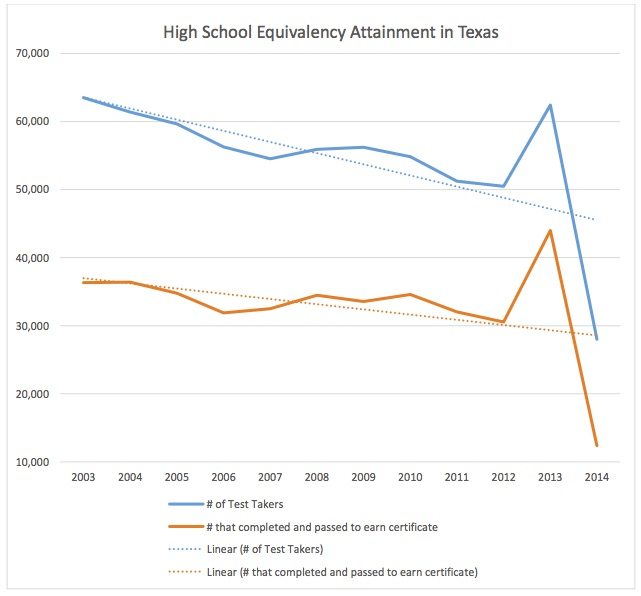
Texas to Offer GED Alternatives After Test Costs Triple

At a State Board of Education meeting Friday, members approved offering two new testing options to Texans seeking their state high school equivalency certificates, in addition to the General Education Development (GED) test currently offered.
The board is retooling the state’s high school equivalency program after the for-profit education publisher Pearson turned the traditional paper-and-pencil test into a computer-based exam and tripled the cost for students in some areas. After the price increase, the number of GED test-takers dropped by 44.5 percent.

The Board initially floated the idea of offering more test options at an hours-long meeting Wednesday, in which members invoked the spirit of “free enterprise” and issued calls to “let the market decide” which test is best. On Friday, a two-thirds majority — of mostly Republican members — approved the two new vendors and tests, though specific contracts have yet to be awarded to the test companies.

Thomas Ratliff, the board’s vice chair, offered an amendment that would have made the contracts contingent on vendors offering an assessment of their tests’ alignment with Texas education standards, but withdrew it. Dallas board member Erika Beltran said she’s concerned that the public won’t know how well the tests adhere to Texas education standards.
“We don’t want to give people the choice of a poor option,” she said. “Now we’re just turning a blind eye and saying, ‘Never mind, we’re not even going to ask the question.’”
Fort Worth’s Patricia Hardy countered by noting the board hadn’t measured how well the existing GED test stacks up to Texas standards, either.
Florence board member Tom Maynard said at Wednesday’s hearing that Texas should offer all three of the newly proposed tests to avoid a“government-created monopoly” that, in other statewide systems, had put teachers and programs at a disadvantage.
“When we actually opened up the marketplace,” he said, “we wound up with systems that were far more advanced, that were far more customer-friendly and, actually, that were much more rigorous.”
By some measures, Texas ranks dead last in the country for educational attainment — according to a U.S. Census report, just under 80 percent of adults in the state have a high school degree or the equivalent. For Texans who don’t graduate from high school, their only current option is to take the official GED test, administered by Pearson.
When the new GED test came out in 2014, two companies developed alternative tests, HiSET and TASC, offered nationwide. Nineteen states adopted the HiSET, from a non-profit that develops the SAT test and administers Texas’ STAAR tests. Twelve states use the TASC, from textbook publisher McGraw Hill.
Both new test options, which offer computer and paper versions of their exams, are cheaper than the GED, which costs $80 before state fees — the HiSET is $50 and the TASC $52, before fees.
There’s no firm timeline yet for when the new tests will be in place, but the board is expected to address next steps in April.


